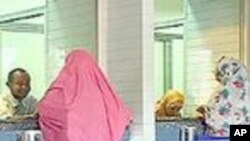<!-- IMAGE -->Because trade is the way countries progress to achieve greater levels of economic growth and development, promoting sustainable and broad-based, market-led economic growth is a top priority of U.S. policy toward Africa. While sub-Saharan Africa has experienced impressive growth rates in recent years, Africa can still be characterized as a rich continent in an impoverished state.
Africa is home to 14 percent of the world's population, covers 20 percent of Earth's total land area and contains nearly one third of its mineral reserves. Yet in 2008, the African Continent's share of global trade was just 3.5 percent. Sub-Saharan Africa accounted for a little more than half of that, less than 2 percent of global trade. “If sub-Saharan Africa were to increase that share by just 1 percentage point to 3 percent," said Assistant U.S. Trade Representative Florizelle Liser at a June 24 congressional hearing, "it would generate additional export revenues of $70 billion annually, which is nearly 3 times the amount of current annual assistance to Africa from all donors. This reflects the importance of trade as a critical platform for Africa’s economic growth.”
Economic growth, driven by trade and investment, is the mechanism that could end poverty in sub-Saharan Africa. Thus, the U.S. employs a number of tools to help in strengthening African economic health and expanding its economic growth. Chief among these are the Millennium Challenge Account, an assistance program run by the Millennium Challenge Corporation, or MCC, that seeks to reduce poverty through sustainable economic growth by awarding sizeable grants to countries that practice good governance, seek to take responsibility for their own development, and are committed to achieving results.
MCC assistance to ten sub-Saharan African countries provides over $3.9 billion in innovative grants that will help improve access to markets, increase productivity, and bolster food security. In addition, the African Growth and Opportunity Act, or AGOA, is a program that allows responsive and responsible partners in Africa to benefit from preferential access to American markets.
In a speech on February 9th, Acting Assistant Secretary Phillip Carter emphasized that despite the tough economic situation, "the United States does not anticipate any reduction in the support that we have provided to African nations."
"Working together," said Assistant Secretary Carter, "I believe that we will see more progress and less frustration, more peace and less conflict, and ultimately, more stability in the world."
Africa is home to 14 percent of the world's population, covers 20 percent of Earth's total land area and contains nearly one third of its mineral reserves. Yet in 2008, the African Continent's share of global trade was just 3.5 percent. Sub-Saharan Africa accounted for a little more than half of that, less than 2 percent of global trade. “If sub-Saharan Africa were to increase that share by just 1 percentage point to 3 percent," said Assistant U.S. Trade Representative Florizelle Liser at a June 24 congressional hearing, "it would generate additional export revenues of $70 billion annually, which is nearly 3 times the amount of current annual assistance to Africa from all donors. This reflects the importance of trade as a critical platform for Africa’s economic growth.”
Economic growth, driven by trade and investment, is the mechanism that could end poverty in sub-Saharan Africa. Thus, the U.S. employs a number of tools to help in strengthening African economic health and expanding its economic growth. Chief among these are the Millennium Challenge Account, an assistance program run by the Millennium Challenge Corporation, or MCC, that seeks to reduce poverty through sustainable economic growth by awarding sizeable grants to countries that practice good governance, seek to take responsibility for their own development, and are committed to achieving results.
MCC assistance to ten sub-Saharan African countries provides over $3.9 billion in innovative grants that will help improve access to markets, increase productivity, and bolster food security. In addition, the African Growth and Opportunity Act, or AGOA, is a program that allows responsive and responsible partners in Africa to benefit from preferential access to American markets.
In a speech on February 9th, Acting Assistant Secretary Phillip Carter emphasized that despite the tough economic situation, "the United States does not anticipate any reduction in the support that we have provided to African nations."
"Working together," said Assistant Secretary Carter, "I believe that we will see more progress and less frustration, more peace and less conflict, and ultimately, more stability in the world."













